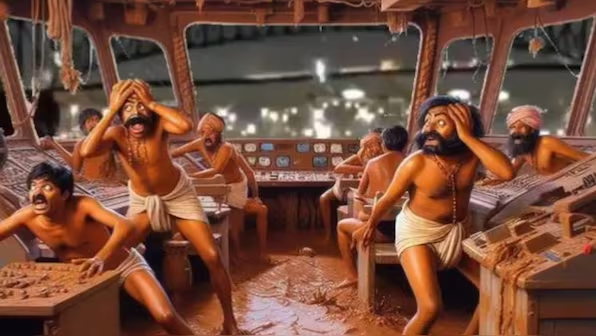By ASHWIN HONAWAR
A recent cartoon from Foxford Comics depicting an Indian ship crew in a demeaning light has ignited a firestorm of criticism. This incident, however, is merely the latest symptom of a larger disease: the persistent use of racial stereotypes in American media.
While the First Amendment guarantees freedom of expression, it doesn’t shield creators from the consequences of bigotry. Reducing an entire ethnicity to punchlines diminishes the achievements of countless Indian-origin individuals who have not only integrated seamlessly into American society, but also risen to the highest echelons of power and influence.
Here’s a wake-up call for Foxford Comics, and frankly, for any media outlet tempted to traffic in tired stereotypes: Indian Americans are a vibrant and diverse community boasting a success story that deserves to be celebrated, not mocked.
Beyond the Offensive Cartoon: A Legacy of Leadership
The image perpetuated by Foxford Comics paints a picture of inefficiency and incompetence. This couldn’t be further from reality. Indian-origin CEOs like Satya Nadella of Microsoft, Sundar Pichai of Google, and Shantanu Narayen of Adobe are at the helm of some of the world’s most innovative companies.
These are individuals who have spearheaded technological revolutions, created jobs across the globe, and redefined the concept of leadership. They are not isolated figures – over 30 Indian-origin CEOs currently lead major corporations in the U.S. alone.
This impressive representation extends beyond the boardroom. Indian Americans are doctors, engineers, scientists, artists – a tapestry of talent woven into the very fabric of American society.
The Kamala Harris Factor: Shattering Glass Ceilings
Foxford Comic’s cartoon becomes even more offensive when we consider a prominent figure of Indian descent: Vice President Kamala Harris. Her political ascension shatters the notion that Indian Americans are somehow limited.
Vice President Harris embodies the American dream – one where hard work and perseverance can lead to the highest office in the land, regardless of ethnicity. Her presence on the world stage is a powerful symbol of inclusivity and a testament to the contributions of the Indian American community.
Freedom of Speech vs. Freedom from Prejudice
Freedom of expression is a cornerstone of American democracy. However, this freedom isn’t absolute. When it comes to racial stereotypes, the line between humor and hate speech blurs.
Cartoons that rely on bigotry not only offend individuals, but also reinforce harmful prejudices that can have real-world consequences. They create a climate where discrimination is normalized, making it harder for minorities to succeed.
The “model minority” myth is another trap to avoid. While Indian Americans have achieved remarkable success, portraying them as a monolith ignores the struggles faced by many within the community. Socioeconomic disparities exist, and issues like language barriers and cultural bias can pose challenges for immigrants.
Moving Beyond the Stereotype Trap
The onus lies with media creators to depict a more nuanced and accurate portrait of Indian Americans. Instead of resorting to tired tropes, they should explore the rich tapestry of experiences within the community. Highlight the stories of entrepreneurs, artists, educators, and community leaders who are making a difference.
Moreover, educational institutions have a role to play in fostering cultural understanding. Curriculums that incorporate the history and contributions of various ethnicities are crucial in creating a more inclusive society.
A Call to Action: Celebrate Diversity
The American story is one of innovation and progress, fueled by the contributions of immigrants from across the globe. Indian Americans are not an exception, but rather a prime example of this continuous evolution.
It’s time for the media to shed the stereotypes and celebrate the diversity that fuels American strength. Let’s focus on the stories of CEOs like Arvind Krishna leading IBM into a new era or Reshma Kewalramani, whose leadership at Vertex Pharmaceuticals is bringing hope to countless patients.
Foxford Comics has an opportunity to redeem itself by using its platform not to spread hate, but to promote understanding. In a world increasingly interconnected, the ability to recognize and appreciate diverse perspectives is more valuable than ever.
Let’s move beyond the confines of the stereotype machine and embrace the rich tapestry of talent that makes America great.






